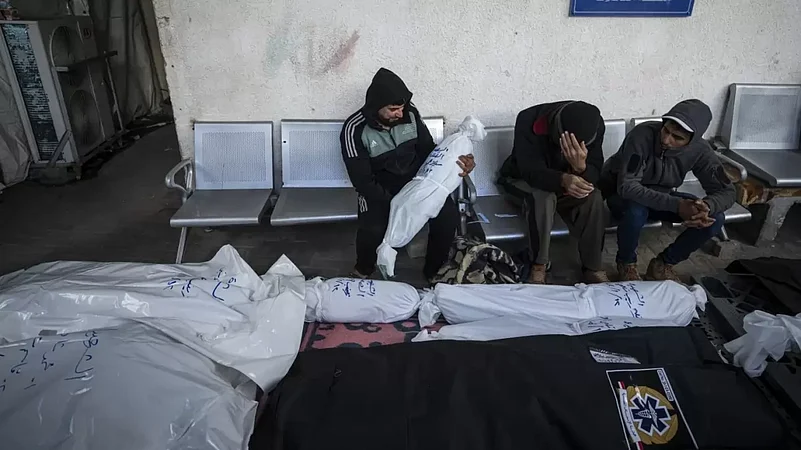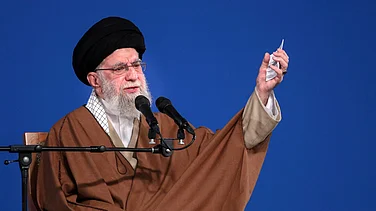Israeli Prime Minister Benjamin Netanyahu has said no one will be able to stop Israel from pursuing its war against Hamas until its victory.
Netanyahu’s speech came as the war between Israel and Hamas which left Gaza ravaged approached the 100-day mark, AP reported.
His remarks also came after the International Court of Justice(ICJ) at The Hague held two days of hearings on South Africa's allegations that Israel is committing genocide against Palestinians, a charge Israel has rejected as libelous and hypocritical.
What has South Africa urged ICJ on Palestinian killings?
South Africa has asked the ICJ to order Israel to halt its blistering air and ground offensive in an interim step.
South Africa cited the soaring death toll and hardships among Gaza civilians, along with inflammatory comments from Israeli leaders presented, as proof of what it called genocidal intent.
In counter arguments on Friday, Israel asked for the case to be dismissed as meritless.
What Netanyahu said?
"No one will stop us, not The Hague, not the axis of evil and not anyone else," Netanyahu was quoted as saying.
Case before ICJ to continue for years:
The case before the world court is expected to go on for years but a ruling on interim steps could come within weeks, AP reported.
Court rulings are binding but difficult to enforce. Netanyahu made clear that Israel would ignore orders to halt the fighting, potentially deepening its isolation.
World bats for ceasefire in Gaza:
Israel has been under growing international pressure to end the war, which has killed more than 23,000 Palestinians in Gaza and led to widespread suffering in the besieged enclave but has so far been shielded by US diplomatic and military support.
Israel argues that ending the war means victory for Hamas, the Islamic militant group that has ruled Gaza since 2007 and is bent on Israel's destruction.
The war was triggered by a deadly October 7 attack in which Hamas and other militants killed some 1,200 people in Israel, mostly civilians. About 250 more were taken hostage, and while some have been released or confirmed dead, more than half are believed to still be in captivity. Sunday marks 100 days of fighting.
Wider Middle East Conflagration:
Fears of a wider conflagration have been palpable since the start of the war. New fronts quickly opened, with Iran-backed groups -- Houthi rebels in Yemen, Hezbollah in Lebanon and Iran-backed militias in Iraq and Syria -- carrying out a range of attacks. From the start, the US increased its military presence in the region to deter an escalation.
Following a Houthi campaign of drone and missile attacks on commercial ships in the Red Sea, the US and Britain launched multiple airstrikes against the rebels on Friday, and the US hit another site Saturday.
In more fallout from the war, the world court this week heard arguments on South Africa's complaint against Israel.
Israel has no immediate plans of returning from Gaza:
Netanyahu and his army chief, Herzl Halevi, said they have no immediate plans to allow the return of displaced Palestinians to northern Gaza, the initial focus of Israel's offensive.
Netanyahu said the issue had been raised by US Secretary of State Antony Blinken during his visit earlier this week.
The Israeli leader said he told Blinken that "we will not return residents (to their homes) when there is fighting".
Israel mulling to close Egypt border with Gaza:
At the same time, Netanyahu said Israel would eventually need to close what he said were breaches along Gaza's border with Egypt.
However, the border area, particularly the city of Rafah in southern Gaza, is packed with hundreds of thousands of Palestinians who had fled northern Gaza, and their presence would complicate any plans to widen Israel's ground offensive.
"We will not end the war until we close this breach," Netanyahu said on Saturday, adding that the government has not yet decided how to do that.
Mounting causalities in Gaza:
In Gaza, where Hamas has put up stiff resistance to Israel's blistering air and ground campaign, the war continued unabated.
The Gaza Health Ministry said on Saturday that 135 Palestinians had been killed in the last 24 hours, bringing the overall toll of the war to 23,843. The count does not differentiate between combatants and civilians, but the ministry has said about two-thirds of the dead are women and children. The ministry said the total number of war-wounded surpassed 60,000.
Since the start of Israel's ground operation in late October, 187 Israeli soldiers have been killed and another 1,099 injured in Gaza, according to the military.
More than 85 per cent of Gaza's population of 2.3 million has been displaced as a result of Israel's air and ground offensive, and vast swathes of the territory have been levelled.
Only 15 of the territory's 36 hospitals are still partially functional, according to OCHA, the United Nations' humanitarian affairs agency.
Shortage of essentials lurks in Gaza:
Amid already severe shortages of food, clean water and fuel in Gaza, OCHA said in its daily report that Israel's severe constraints on humanitarian missions and outright denials had increased since the start of the year.
The agency said only 21 per cent of planned deliveries of food, medicine, water and other supplies have been successfully reaching northern Gaza.


























